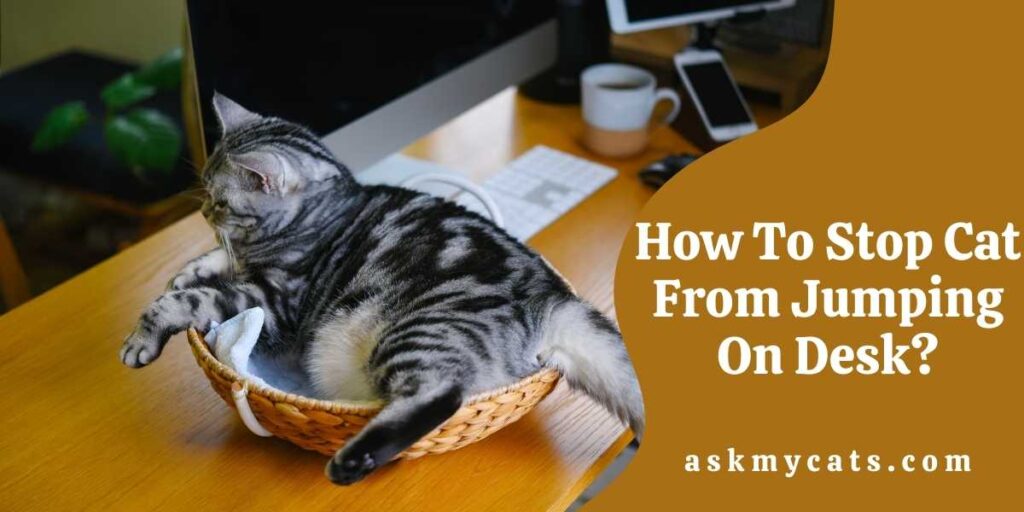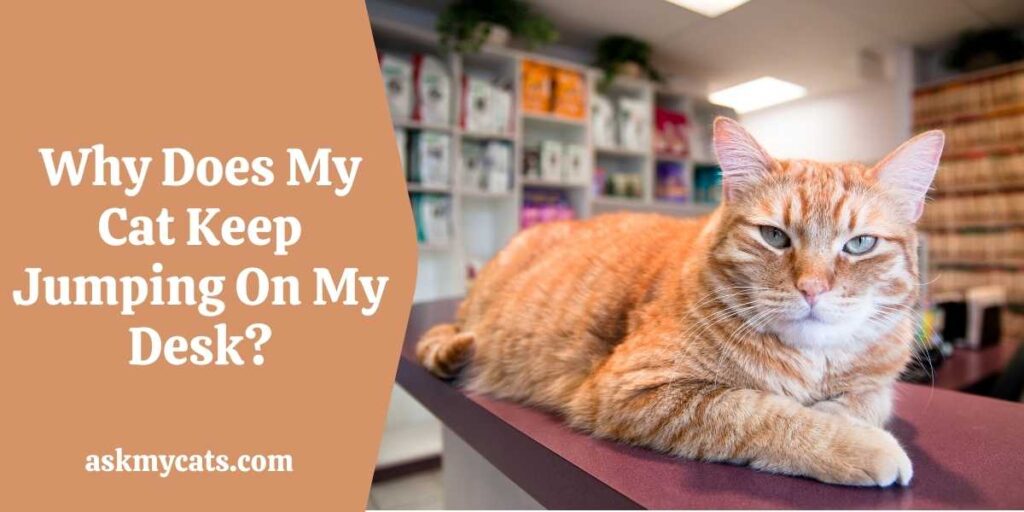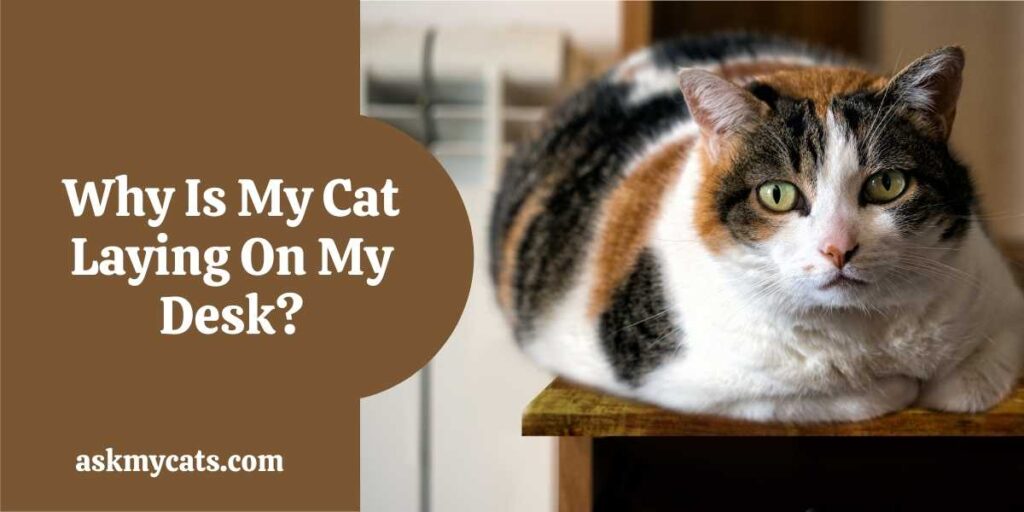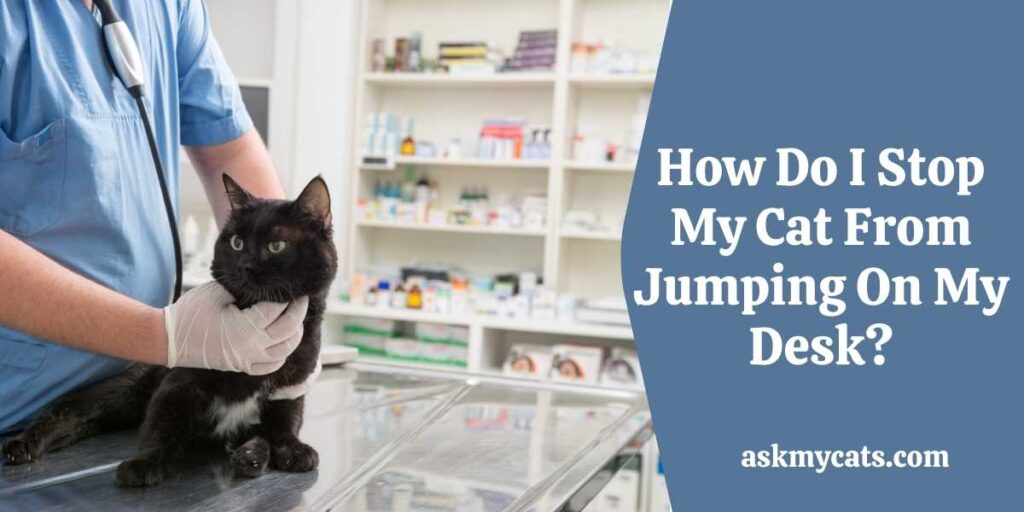Cats are born with the ability to climb and jump. Cats in the wild climb trees and leap great distances to navigate their area, avoid danger, and obtain food.
As a result, it’s not surprising that many domesticated cats try to activate these impulses even while they reside inside.
Put double-sided tape on your desk in the areas where he attempts to leap up, and most cats dislike sticky things touching their paws. So, they will stop jumping on the desk automatically.
As a result, cats may leap onto anything in your home that you want them to avoid. You’ll need to devise techniques to keep your pet off worktops, tables, and other surfaces.


Give Your Cat the Perfect Day
Get the Free Ebook!
Why Does My Cat Keep Jumping On My Desk?
Your cat keeps jumping on your desk because he wants your attention.

The opportunity to be in an elevated space is a critical social demand for cats. Because they are both predators and prey in the animal realm, these locations provide a secure haven and an excellent view position.
Allowing your cat to roam around your table and countertops in your house, on the other hand, might be unclean, and many owners consider these areas off-limits to the cat.
Cats prefer vertical areas to rest, as do other pets and children. These places give the cat a greater perspective of their surroundings than they would otherwise have since they are so near to the ground.
Not to mention, they are more human-like and may attract attention more easily.
If this behavior is encouraged, cats may engage in it more frequently. Reinforcement enhances behavior; the problem is determining what is reinforcing to the cat.
Cats prefer sitting in lofty positions. They can better view the surroundings, feel safer, and perhaps even discover food!
If your cat leaps up and helps themselves to an open bag of chips, they’ve just rewarded themselves for being on the counter. The more goodies your cat receives while doing this, the more probable it is that they will continue.
When your cat is on the counter or table, they are unlikely to discover something to eat. Unfortunately, because they only get treats a portion of the time, this reinforces the behavior even more.
This is known as intermittent reinforcement, and it is similar to gambling. When you gamble, most of the time, you don’t receive anything, but now and then, you get the jackpot, and the unpredictability of the payoff motivates you to keep trying.
Even verbally scolding the cat for this may encourage them to do it again. Cats may leap on the table to catch your attention. When you chastise them for their conduct, you still provide them with the attention they need.
Why Is My Cat Laying On My Desk?
Your cat is laying on the desk because he finds the place comfortable to rest.

Your cat is likely to sleep on your desk since it finds it comfy and feels secure being somewhere where you spend most of your time.
If your cat has not always sat at your desk, remember what else happened when your cat first began doing so.
If your cat started doing it unexpectedly, it might be because you began spending more time at your desk or because another location became unavailable to your cat.
It’s also a good idea to think about when your cat sits at your desk. If your cat sits there when you’re at your desk, it’s much more probable that your cat is doing so because you’re there, and you make your cat feel safer.
How Do I Stop My Cat From Jumping On My Desk?
You can stop cats from jumping on your desk by restricting their movements.

The cat may be encouraging themselves by locating food or stuff to play with on the table, so make sure you remove any appealing objects and clean the area.
If you give your cats empty paper shopping bags or boxes on the ground, keep in mind that they will appear just like the one on the table.
Even if the cat is in a banned area, objects like these might make it challenging to resist. Making the place as uninteresting as possible will keep them from leaping up there.
Because one of the significant reasons cats climb onto the table is to have a better view, it’s a good idea to provide them with a cat tree or another object of equivalent height, such as a shelf. This will let your cat to be raised in a good area for them to be on.
If you notice your cat making an intelligent decision by climbing onto an appropriate elevated location, reward them with vocal praise or food! You want to make this location more enjoyable than the restricted area.
Punishing your cat verbally or physically will do more harm than good. Your cat will most likely continue to jump on the table since they perceive your scolding as encouraging, especially if they are doing it for attention.
Keep in mind that negative attention is still attention.
Another side effect of punishment is that your cat develops a dread of you. If your cat does not trust you, the harm to your relationship will make managing stressful circumstances much more difficult. When a link is broken, it can be not easy to rebuild trust.
How To Cat Proof Your Desk?
1. Cover The Desk
Keyboard coverings are inconvenient, but they might save your laptop if you have cats or toddlers. Both toddlers and cats tend to knock things over, and the latter shed hair that gets into your keyboard.
Not only would this prevent your keys from operating correctly, but it will also impair the cooling capacity of your laptop. This impacts airflow, putting unnecessary strain on the fans, and the ensuing heat isn’t suitable for the internal components.
2. Deter Your Feline Friend
If you want to take things to the next level, you should keep your cat away from the desk area. Before you begin, make sure you’re okay with turning your desk (or laptop) into a no-go zone!
Because cats despise sticky surfaces, double-sided tape is your best friend. Lay a few strips around the edge of your desk, on your laptop, around your work area, and wherever else you don’t want your cats to be.
You may buy things like Sticky Paws or use something less expensive from the grocery.
These are only temporary solutions, and your cat will soon identify the location with the unpleasant sensation of walking on a sticky surface.
Once you’ve established the link, your cat should remember not to go there. You may constantly reapply a few strips to refresh their recollection.
3. Provide Other Distractions
If your cat is begging for your attention, it’s most likely because they’re bored. If you don’t have a decent assortment of toys for your pet, head to the pet store and open your wallet.
Please pick up a few and discover what your cat likes: balls, little mice, kicker toys like this catnip giraffe, scratching posts, and catnip toys will all help to divert their attention.
Catnip spray may also excite their attention, and you can use it to spruce up other toys when your cat thinks it’s time to play. Combine them with a cat activity tunnel and watch the sparks fly!
They may also want to be near you or find a comfortable area to snuggle up and slumber. Cats sleep 18 hours every day; therefore, bedding is essential.
A warm cat igloo can hopefully distract a kitty from your laptop, or try hanging a sturdy cat perch in a beautiful sunny window instead.
You must like to read details about How To Keep Cat From Jumping Over Gate
Frequently Asked Questions
Why does my cat sleep where I work?
Cats’ usual body temperatures vary from 99.5°F to 102.5°F and keeping that temperature stable takes effort. Cold cats are considerably more prone to seek out your body for warmth. As a result, your cat may sleep on you more often at night throughout the winter.
How do you keep cats off electronics?
One of the first is to switch off their gadget when not in use to remain calm and safe for your cat if they decide to contact it or lie down on it. Keeping the gadget turned off will also keep it dark and unlit since a lighted device would attract attention and make it more difficult for a curious cat to avoid approaching it.
Can my cat sit on my PC?
You’ll get cat hair inside your computer, but that’s about it. A cat cannot hermetically plug air ducts; thus, even if the airflow is reduced, PC is unlikely to die, even if the cat is sitting directly on top of the air holes. The cat may become overheated, and its fur may enter the computer and obstruct the circuitry.
Final Words
Environmental deterrents are items that your cat dislikes but will not harm them. Unpleasant odours or textures are excellent ways to keep your cat away from jumping on your desk without penalising them. They’re also less stressful than screaming or using spray bottles.
Ask your questions in the comments section below.
